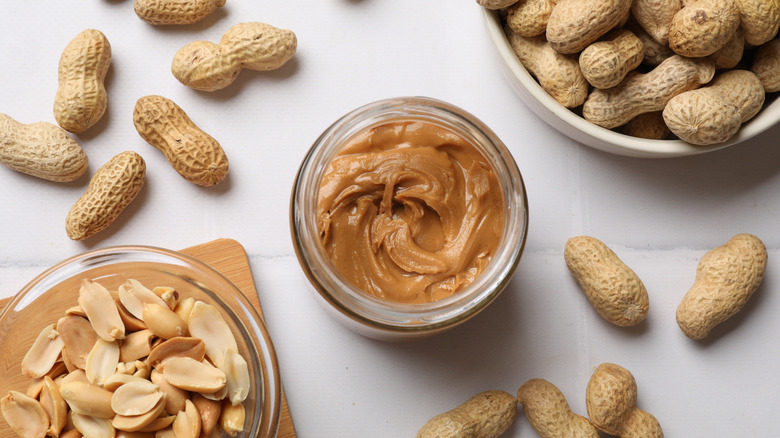Is Natural Peanut Butter Considered Processed Food?
Be it GMO, keto, or paleo, there are a slew of buzzwords that inform the sometimes spicy and controversial discourse on food and nutrition. Although food labels help us make educated decisions for our dietary well-being, certain terms and phrases that frame food-forward conversations are easily misconstrued and misunderstood. "Processed" food, for example, often touts a dangerous connotation, but not all processed food is bad. In fact, processing food is an essential and foundational part of cooking and baking. Natural peanut butter, for example, is a nutrient-dense spread rich in healthy fats, protein, and essential vitamins and minerals — but it's also a processed food.
Processed food refers to any whole ingredient that has been altered or transformed from its original state for convenience, flavor, texture, or preservation enhancements. The best and worst natural peanut butters all start with whole peanuts alike — an unprocessed food. The process begins with roasting the nuts to unlock a caramelized flavor and continues as they are ground into a smooth and creamy texture. That bread you smother it on? Also processed. The jam you combine it with? That's processed too. Unless you are eating exclusively whole foods that have not been sliced, diced, cooked, roasted, or blended, then you are likely eating processed food every day without even realizing it. Peanut butter is a powerhouse ingredient that can jazz up a million and one different recipes, both sweet and savory (trust us, it belongs on salmon), so don't get caught buying into its myths. Just because natural peanut butter is technically a processed food, doesn't mean it needs to be banished to your no-buy list.
Understanding ultra-processed peanut butter
Although the true definition of processed food has lost its meaning to hyperbole, there's good reason for concern. When foodies and nutritionists issue warnings about processed foods, they're likely talking about those that are ultra-processed — a term coined by Carlos Monteiro, professor of nutrition and public health at the University of São Paulo in Brazil. Because it's an emerging food-speak, the FDA has yet to determine exactly what constitutes an ultra-processed food, but it's generally accepted as food that has multiple added ingredients, many of which are not common to household kitchens, and has undergone multiple significant changes to its whole form. That means some sweetened or flavored peanut butter might be considered an ultra-processed food.
Sweetened peanut butter is a treat that can make your eyes water with joy after licking clean a spoonful scooped right from the jar. Although it's great on cakes, desserts, and PB&J sandwiches, sweetened peanut butter often contains high levels of added sugar and saturated fats from sources like palm oil — ingredients known to increase the risk for diabetes and cardiovascular disease. Although the research is still new, as is the terminology, Medical News Today reports that doctors across the United States are issuing warnings against the dangers of consuming ultra-processed foods, including sweetened peanut butter, in excess.
Although it ultimately boils down to semantics, natural peanut butter is indeed a processed food, albeit a nutritious one. It's those that are made with excessive added ingredients that are ultra-processed. Read nutrition labels and use your discernment to select a jar of peanut butter that best suits your dietary preferences.

